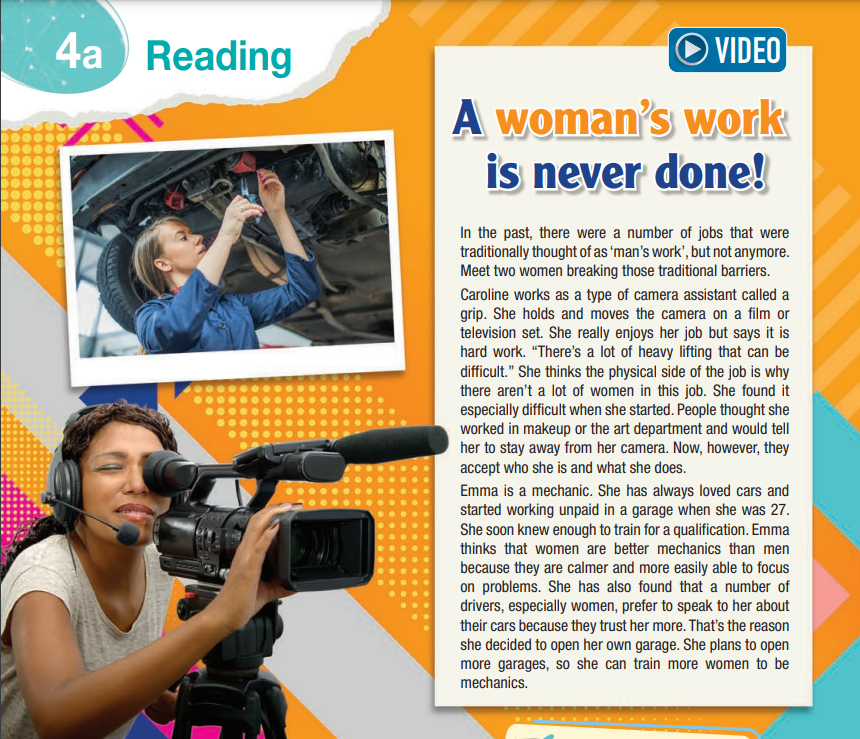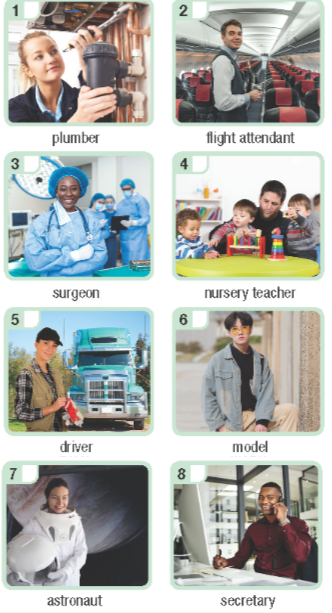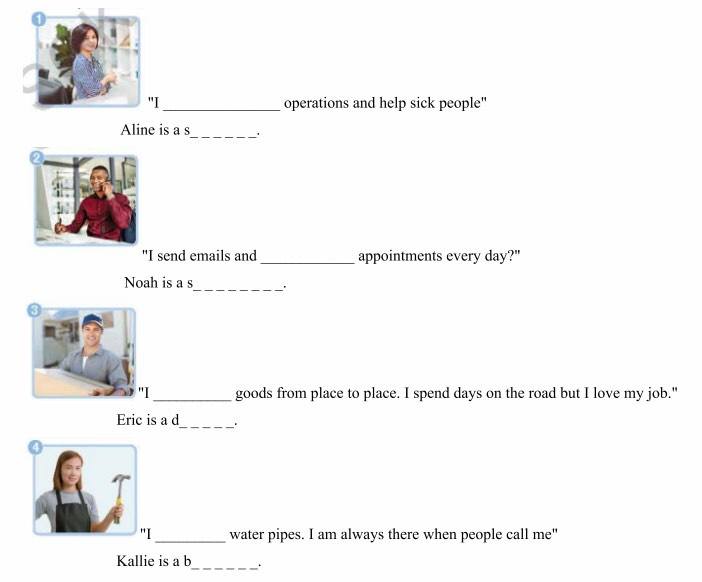Giải SGK, SBT Unit 4. Gender equality Bright
Giải SGK, SBT Unit 4. Gender equality Bright
3. Circle the words with an /ɜː/ sound and underline the words with an /ə/ sound. Listen and check. Then practise saying them with a partner.
(Khoanh tròn các từ có âm /ɜː/ và gạch chân các từ có âm / ə /. Nghe và kiểm tra. Sau đó, thực hành nói chúng với bạn bè.)
|
nurse pilot computer first famous world average salary mother work |
6. Read the theory box. How do the two conditionals differ?
(Đọc hộp lý thuyết. Hai câu điều kiện khác nhau như thế nào?)
CONDITIONAL TYPE 1 (FIRST CONDITIONAL)
(Câu điều kiện loại 1)
|
if-clause (mệnh đề if) |
result clause (mệnh đề kết quả) |
|
if + Present Simple (if + hiện tại đơn) |
will/won’t + base form of the main verb (will/won’t + dạng nguyên mẫu của động từ chính) |
|
If I join this firm, (Nếu tôi làm ở công ty này,) |
I will get a good salary. (Tôi sẽ có một mức lương cao.) |
We use conditional type 1 to talk about real situations that are likely to happen in the present/future.
(Chúng ta sử dụng câu điều kiện loại 1 để nói về những tình huống thực tế có khả năng xảy ra trong hiện tại / tương lai.)
NOTE (Lưu ý): Unless = if not
Unless it rains, we’ll go out. (= If it doesn’t rain, we’ll go out.)
(Nếu trời không mưa, chúng ta sẽ đi ra ngoài.)
CONDITIONAL TYPE 2 (SECOND CONDITIONAL)
(Câu điều kiện loại 2)
|
if-clause (mệnh đề if) |
result clause (mệnh đề kết quả) |
|
if + Past Simple (if + quá khứ đơn) |
would + base form of the main verb (would + dạng nguyên mẫu của động từ chính) |
|
If I got that job position, (Nếu tôi nhận được vị trí công việc này,) |
I would travel around the world. (tôi sẽ đi du lịch vòng quanh thế giới.) |
We use conditional type 2 to talk about unreal, imaginary situations in the present/future.
(Chúng ta sử dụng câu điều kiện loại 2 để nói về những tình huống không có thật, trong tưởng tượng ở hiện tại / tương lai.)
• We often use were instead of was in the if-clauses.
(Chúng ta thường sử dụng were thay vì was trong mệnh đề if.)
If Josh were interested in the job, he would accept it.
(Nếu Josh hứng thú với công việc này, anh ấy sẽ nhận lời.)
• To give advice, we use the expression: If I were you …
(Để đưa ra lời khuyên, chúng ta sử dụng cách diễn đạt: If I were you (Nếu tôi là bạn)…)
If I were you, I would ask for a pay raise.
(Nếu tôi là bạn, tôi sẽ yêu cầu tăng lương.)
3. Replace the underlined phrases/sentences in the dialogue in Exercise 2 with the ones from the Useful Language box.
(Thay thế các cụm từ / câu được gạch dưới trong đoạn hội thoại ở Bài tập 2 bằng các cụm từ / câu trong hộp Ngôn ngữ hữu ích.)
|
Useful Language |
|
|
Expressing opinions |
Agreeing |
|
• I believe … • In my opinion, … • To my mind, … |
• You’re right. • I agree. • That’s for sure. |
b) What are the topic sentence, supporting sentences and concluding sentence in the paragraph?
(Câu chủ đề, câu hỗ trợ và câu kết luận trong đoạn văn là gì?)
|
Paragraph structure (Cấu trúc đoạn văn) An opinion paragraph has three main parts: (Một đoạn ý kiến gồm 3 phần chính: ) • A topic sentence stating the topic and opinion of the writer (Câu chủ đề nêu chủ đề và quan điểm của người viết) • Supporting sentences giving the viewpoints with examples/reasons (Các câu hỗ trợ đưa ra quan điểm với các ví dụ / lý do) • A concluding sentence restating the opinion using different words (Một câu kết luận trình bày lại ý kiến bằng cách sử dụng các từ khác nhau) |
3. Match the viewpoints (1–2) to the examples/reasons (a–b). Then join them using because.
(Nối quan điểm (1–2) với các ví dụ / lý do (a – b). Sau đó, nối chúng bằng cách sử dụng “because”.)
|
1 |
|
Mothers who go to work are good role models.
|
2 |
|
Going to work allows women to be independent.
a. It builds up their self-confidence.
b. Children see that they can achieve what they want.
5. Write your paragraph (about 120–150 words).
(Viết đoạn văn của bạn (khoảng 120–150 từ).)
• Use the paragraph in Exercise 1 as a model.
• Use the ideas in Exercise 3 and your answers in Exercise 4.
• Use the plan below.
|
Plan Topic sentence: stating the topic & expressing your opinion Supporting sentences: presenting your viewpoints with examples/reasons Concluding sentence: restating your opinion using different words |
3. Put the words in the correct column according to the sound of the underlined letters. Then listen and check.
(Đặt các từ vào đúng cột theo âm của các chữ cái được gạch chân. Sau đó lắng nghe và kiểm tra.)
|
• mechanic • secretary • astronaut • traditional • perform • scientist • photographer • nursery • surgeon • earn |
Now say the words and record yourself. Listen to your words and check if you pronounce them correctly.
(Bây giờ, đọc các từ và ghi âm lại. Lắng nghe và kiểm tra xem nếu bạn phát âm đúng.)
CÁC BÀI TẬP KHÁC



















